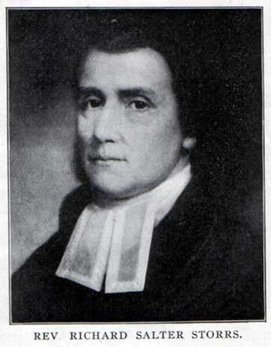

|
On October 13, 1783, the precinct of Longmeadow became a town. As it was the first to be incorporated after the signing of the treaty of peace on September 3rd, Longmeadow came to be known as the "oldest child of the state". Our prominent tavern-keeper of Revolutionary times, Nathaniel Ely, was agent of the precinct at the General Court; and, as such, had charge of what was known as the "Important Business". For those interested readers not having access to the text of this Act, I have transcribed it below. Many changes were brought about with the ushering in of this new era. The chief interest still centered around the church, and people were taxed for its support. With the death of Reverend Stephen Williams came the pastorate of Rev. Richard Salter Storrs. A name familiar to all of us. A grand-nephew of Dr. Williams and his heir-apparent, Mr. Storrs was ordained in December, 1785. |
 |
|
As the population had increased, a significant number of the settlers had pushed eastward and became early settlers in what would later become East Longmeadow, Somers, Wilbraham, Hampden, and even Vermont. As a point of reference, the entire population of the Connecticut River Valley (Massachusetts and Connecticut) was said not to exceed 800 by the end of the 17th century. The year 1819 was a calamitous one for the town and the region as well. It was a year of unusually high illness and mortality. Men and women, old and young, were stricken down. A stroll through Longmeadow Cemetery will bear witness to the power of this unknown disease. Among those lost were Mr. Jabez Colton, "the most valuable man in town next to the pastor", Deacon Walter White; and, most overwhelming, Rev. R.S. Storrs, himself. His death was a great blow to the community. His pastorate had lasted nearly 32-years, and a generation had grown up under his care.
|
|
|
| The pastorates of Dr. Williams and Mr. Storrs covered a century. With the passing of that era, community and church life were to gradually assume a more modern quality, with taxation of the town to support the ministry to end. With one more move of the church would begin the modern history of Longmeadow. |
|
"An Act to incorporate the Second Parish in Springfield called Longmeadow, into a Town by the Name of Longmeadow. Whereas it is represented by the inhabitants of the Said Parish,
that they labour under great burdens and inconveniences by reason
of their Situation, and the Separate Interests in the Said Town;
and it appears to the Court to be expedient that the Said Parish
be incorporated into a Separate Town: |
|
The spelling "Olde Long Meddowe" first came to my attention on the cover of the souvenir booklet memorializing the first Long Meddowe Days, May 30-31, 1981. I have yet to find that particular spelling elsewhere in my research, and I take it to be a twentieth century construct and, perhaps, marketing tool. The oldest spelling I found was Long Meadowe. I am sure both were used, as our pioneering ancestors were said to be "as independent and original in their spelling as in their character". Shakespeare is said to have spelled his own name thirty different ways and Queen Elizabeth spelled the word "sovereign" in seven. More importantly, between the town's incorporation in 1783 and 1812, several attempts were made to change the name of the town. On May 4, 1812 it was voted that "the committee chosen April 6, 1802 on the Business of Altering the Name of the Town attend further to their Business and look out a Name which may suit the Town to receive instead of their present, and report to their Town at their meeting next November." At the meeting of November 2, 1812 it was voted to petition the General Court to change the name of the town to Lisbon. The project was, fortunately, abandoned with the discovery that there was already a town by that name in the Commonwealth. |